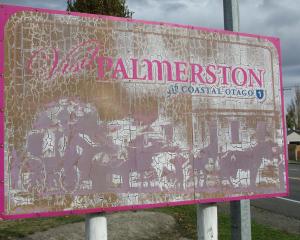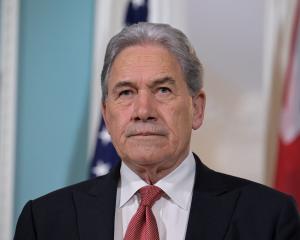Former MP Gerrard Eckhoff explains why Otago needs independent MPs.
The party machines of all hues take a very dim view of MPs with the temerity to publicly challenge their party's position on behalf of their constituents.
AT first glance, the eventual loss of so many Otago institutions such as Hillside workshops and, potentially, the Invermay research facility has little to do with the way we elect our political representatives to Parliament.
In fact, it has everything to do with our electoral system that allows political parties to appoint our representatives.
The fault lies directly with the political party system. National, Labour, Greens, NZ First and so on, all exercise total control of whom they accept into Parliament, not the voters. The voters elect the parties and the MPs are chosen by the party.
If all MPs were elected as independent members of Parliament (as they once were) it is dollars to doughnuts Invermay would not be impacted, as the Government would need the support and votes of the Otago representatives to support and pass any legislation, especially where the ayes and noes are finely balanced as they are with this Parliament.
It goes without saying that all the current opposition party MPs will describe the loss of any Otago institution as an outrageously short-sighed decision taken by those who cannot be trusted to open or close a corner dairy. It's the opposition's job to condemn any closures, anywhere, and for any reason. This is a result of the adversarial system.
The two Otago Government MPs, Michael Woodhouse and Jacqui Dean, must always weigh up the consequences of voting against or even speaking out against their party's policy which impacts on this region's future for fear of losing (a) their current list position within the party for speaking out and (b) the nomination for their respective seats for the 2014 general election.
The party machines of all hues take a very dim view of MPs with the temerity to publicly challenge their party's position on behalf of their constituents.
Those with a list position of 40 or more are in real danger of falling off the list completely - not necessarily a bad thing for the regions' influence in Wellington. Some years ago, a few MPs did speak out as their conscience dictated and were summarily dismissed to the back bench or were to remain persona non grata.
The names of Derek Quigley, John A. Lee, Marilyn Waring, Mike Minogue, and Norman Jones conjure up images of strong-minded people who chose to sacrifice their parliamentary careers to uphold their duty to their constituents over obligations to their party. They (collectively) would have also made a damned fine cabinet.
Political parties promote form over substance in parliamentary debates which are often not very relevant to everyday life in New Zealand, yet nothing changes - even under MMP.
MMP was meant to be a game-changer but all that has happened is that now seven party leaders get to state their opinions versus only two before.
Their respective teams dutifully follow the leader. Just how an MMP Parliament with its supposed diversity of opinion could have appropriated $34 million for a boat race between four contestants whose total worth rivals some countries' total income is worthy of reflection.
Surely, a couple of independently minded Government MPs could have discovered the America's Cup is the province of the super-wealthy who probably don't need a subsidy from somebody in New Zealand earning $15 an hour.
The vote on the ''more pokies for a Convention Centre Bill'' in Auckland is another case in point. Social issues such as liquor and gaming laws, abortion, prostitution etc are traditionally conscience votes. With the Sky City casino deal, all National Party MPs suddenly discovered they had exactly the same conscience as the prime minister.
Had Parliament been full of independent MPs, that Bill was likely never to have passed the first reading. Has the question ever been asked as to what exactly is wrong with MPs' obedience to conscience over their party affiliation?
The Labour Party has a rule that says their MPs cannot vote against a caucus decision; so out with independence of thought.
A Parliament of independent MPs is likely to vote down a GCSB-type Bill by a huge majority, whereas under the current system it will pass by one vote. All that is needed to stop that Bill is one independently minded National MP to say no.
Of course, one time-honoured method of a government controlling its caucus is to appoint as many ministers outside cabinet as is humanly possible. Racing, Auckland affairs, women's affairs, consumer affairs and so on.
Mrs Dean, who is in the 40s on the party list, needs only to make some independent and grumpy noises about the GCSB Bill in the same breath for something to happen. It will very rapidly cross the prime minister's mind a Minister for Wilding Pine Control has real merit, and who better than a grumpy MP from Otago.
That's how our parliamentary system works, where independence of thought and action is not highly valued, whereas compliance with the view that all MPs are in Parliament thanks only to their respective party's selection process is entirely the accepted wisdom.
I'm not at all sure where the poor old voters fit in this wonderful world of political party domination through MMP. We might just as well revert to the first-past-the-post system.
I became an MP due entirely to the whims of the very party process which I now challenge.
All of the above comes back to the question as to whether the present system delivers effective regional representation in Parliament.
Does Otago need independent representatives in Parliament? Absolutely we do, and with 2014 looming maybe we should consider telling the resident foxes to hand back the keys to the Wellington hen house.
Gerrard Eckhoff, of Alexandra, was an Act MP from 1999 to 2005. This article was received last Friday, before the proposal by Ian Taylor for a southern party and the Stand Up Otago reports.












